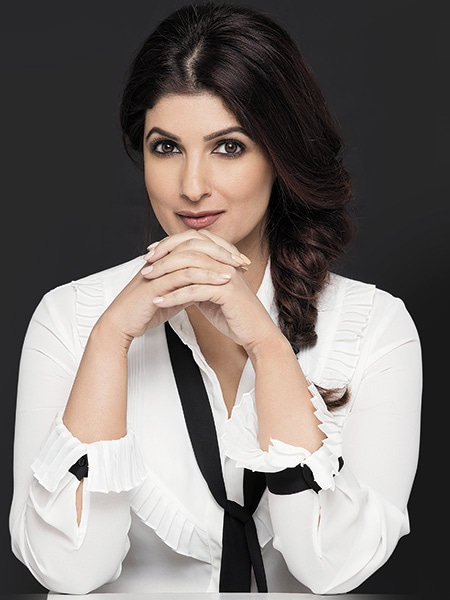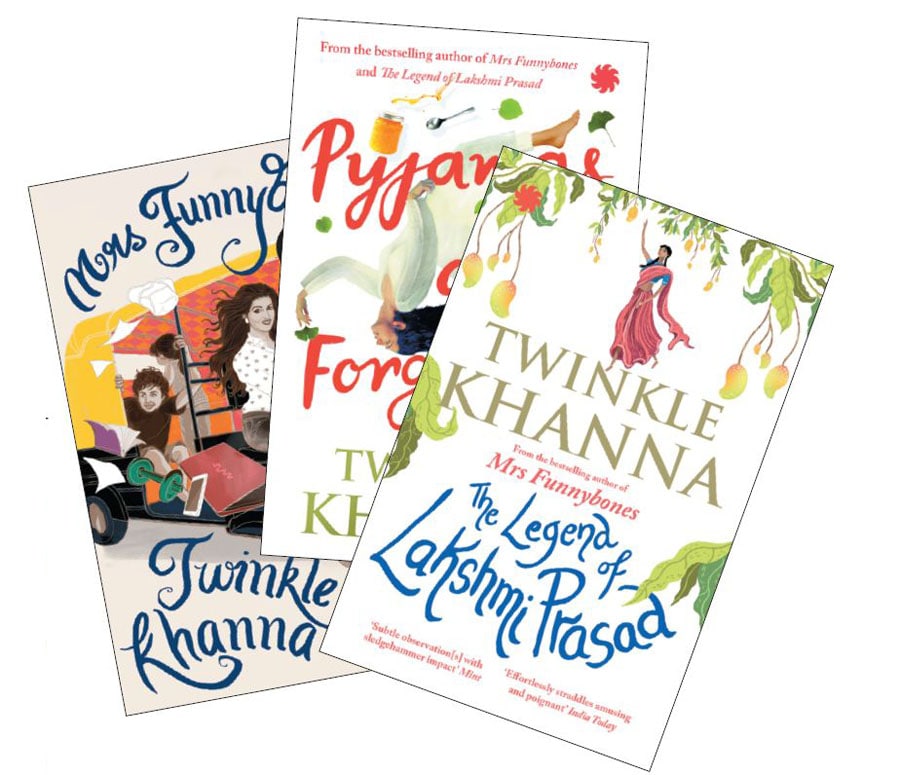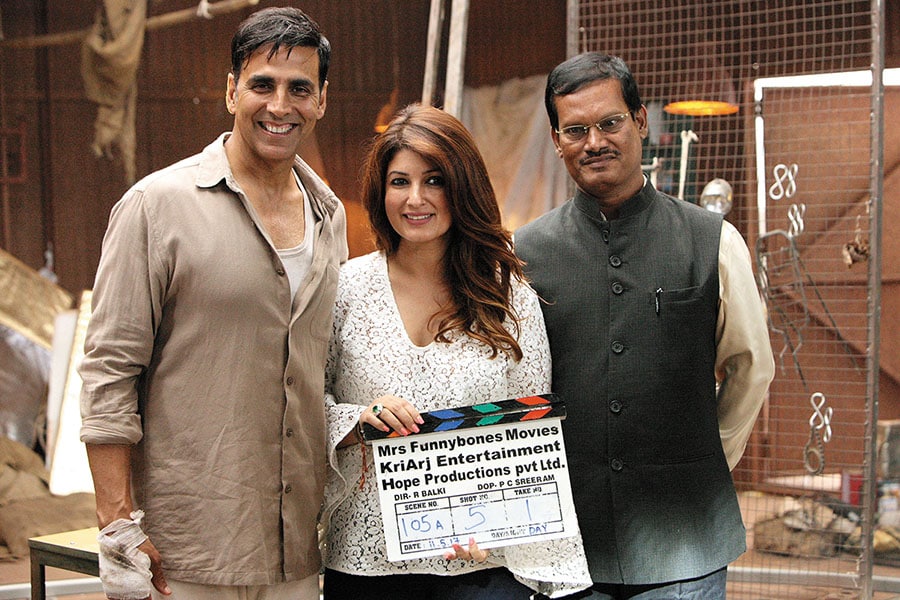
It's always a good time to have a sense of humour: Twinkle Khanna on Tweak India
Twinkle Khanna, whose newest venture is a digital content company targetted at women, talks about wearing the many hats of actor-producer, author, and the need for intelligent—and irreverent—women-centric conversations
 Twinkle Khanna actor-turned-entrepreneur
Twinkle Khanna actor-turned-entrepreneurImage: Dabboo Ratnani
I meet with Twinkle Khanna on a Monday morning at her Juhu apartment-turned-office, a space she shares with her husband, actor Akshay Kumar. Her spacious cabin is bathed in sunlight, and looks out over the sea. I’m a few minutes early, and she is already there, working at her desk and ready for me.
There are books everywhere. On her desk is a bookmarked-copy of Sally Rooney’s Normal People, a novel that I happen to be reading at the time too. Rooney’s writing is deep but not didactic, simple yet stirring, and loaded with a healthy dose of dark humour and irreverence. Not unlike Khanna’s own.
‘Irreverent’ is a word that crops up more than once through the morning, apt to describe the conversation, Khanna’s brazen personality and her newest venture. After dabbling in acting and interior design, writing and film production, Khanna, known for her incisive wit, now has another addition to her already-full plate. Khanna speaks to Forbes India about Tweak, a digital media platform for women with content that isn’t dumbed down, and conversations that go well beyond skincare regimes. Edited excerpts:
Q. Why did you decide on entering the content space now, when many media houses are struggling?
I never really looked at a business in terms of whether or not it would make money. For example, on paper, Pad Man [the 2018 film that she co-produced] was never a money-making prospect. People said, no one wants to say the word ‘period’, and you want to make a movie about it that you think people will go and see? And I think we earned about Rs 85 crore. If you really believe and you think there’s something significant you can say, or alter conversations within conversations, then you don’t have to look at money in the same way that you would in a project where your primary goal is money.
My goal has never been money, but luckily for me, it has always followed me in whatever I have done. It’s always been that I see there is a need or a gap.
I’ve had the idea for five years, but I wasn’t sure in which format we would be doing this. Initially, I thought it could be a TV show, but I’m not someone who enjoys being in front of the camera. I’m happy being behind my desk, where I don’t have to think about whether my eyelashes are flying off on one side. So I started working on this actively about a year ago. It takes that much time to put all the pieces of this puzzle together.
As to why other portals have failed, they know their business best, but what I saw was a regurgitation of the same thing. What we’re trying to do is address issues that women need to know about, but not in a pedantic manner. It will be fun and irreverent. I don’t know if anyone else is doing that at this point of time.
Just a couple of days ago, I saw a story on Poosh [Kourtney Kardashian’s women-focussed website], where they were talking about how to clean your vagina, without using the word vagina. So they’re calling it “yoo-hoo” and “down there”. What we’d like to do is technically use the words for body parts, and be unabashed about it. That’s also partly why we may succeed, because no one else is doing that.

Twinkle Khanna says she struggles a lot more with the columns that she writes than with books
Q. Tell us about the name Tweak, and what its focus will be.
I don’t think we’re reinventing the wheel; we’re just making it a better ride, filling a few potholes, so Tweak fit well.
I would look at it as a way to stretch your brain. Our thrust is not on any one thing. Our focus is not so much on fashion, I would say, but we’ve got style, we’ve got wellness, health, parenting, a large emphasis on reading and books. It’s not about particular conversations, but how we address them. If you think about it, it’s absurd: You need a licence to drive a car, but to parent, or guide someone through their entire lifetime, it’s just guesswork. So maybe we can cater something you can rely on. We have a lot of experts and contributors on board.
We want to focus on things like mental health and women’s sexuality—but not necessarily how to have nine orgasms in three minutes. We will look at it realistically and hope to take away the giggling and embarrassment we seem to have about our biology.
Q. What will the writing be like?
Hopefully, it should do three things: It should give you information, make you smile, and make you think. There’ll be certain pieces that just succeed in one of these, but our best pieces will certainly do all three. Some pieces will be reporting-based, interview-based, experience-based. We also have a large video vertical. We have long reads and short reads, so it’s up to you how you want to consume the content.
Q. What sort of stories would Tweak never touch?
There’s nothing like that, but we are trying our best not to do certain things. I see a lot of wellness platforms that are telling you that if you don’t exfoliate three times a week, it’s doomsday. I don’t think anything is doomsday. What we’re trying to say is, these are your options, there’s no judgement and this is a safe space for bigger conversations.
Q. Why do you think there haven’t been many women-focussed content platforms that are intellectually driven?
I have no idea, because I haven’t been behind those ventures. But I’m grateful that there is an opportunity. Nothing in life is guaranteed; I may do a Produnova [a gymnastic vault] and three somersaults and land on my feet, or I may fall on my a**. But I have to try, and that’s what it is.
Q. You’ve always been known for being outspoken. Do you feel there’s a need to self-censor when you’re running a business like this?
It depends. Everyone is self-censoring at this point to some degree; I can’t lie and say that everyone is saying exactly what they’re thinking. But I don’t think we are working towards the topics that require self-censorship. And anyway, with satire, the lucky part is that you can still say a lot of things that are censored by humour, but get the message across. Hopefully, we’ll be able to do that with Tweak as well.
 Pad Man, a film that she produced in 2018, won the National Award. Here she’s seen with actor and husband Akshay Kumar (left) and Aruna-chalam Muru-ganantham on whose life it was based
Pad Man, a film that she produced in 2018, won the National Award. Here she’s seen with actor and husband Akshay Kumar (left) and Aruna-chalam Muru-ganantham on whose life it was basedQ. Would you say that’s the role of humour writing in the India of today?
It’s always been the role of satire. It’s always about punching up and not punching down—I learnt that the hard way. There’s a thin line between pulling someone down and writing a humorous piece. You have to attack the elephants and not just stamp on the ants.
It’s not just today. We’re looking at the world right now and thinking this is the bottom, but there have been times like this before. They have passed. You need a sense of humour in every time period. At least I do.
Q. How would you say you have evolved as a writer over the years?
It’s a difficult question. I do two different kinds of writing: Columns and books. I’ve always found that I struggle a lot more over the columns than I do with books, because in the columns, I’m trying to link bizarre things. In one, I was trying to link the black hole with Shashi Tharoor and Hema Malini. Why? I don’t know. But I did find a common thread!
Writing is not a tangible skill. A doctor has instruments and procedures, a writer doesn’t. In the beginning, I would stress about a lot of things, worry about whether I could replicate a certain column’s success. Finally now, I can believe that it is something that’s within me, that I’m not going to lose. I’ll be able to do that all my life till I have Alzheimer’s, and then it won’t matter anyway, because I won’t remember [laughs]!
Q. Do you have a writing ritual?
No. I prefer writing early in the morning, after my daughter goes off to school. When I start a book, I can pretty much do everything else and write. But by the end, it completely consumes me. And then, when you submit the book and all the copy-editing is done, you feel incredibly lonely. Because you have this space in your head, and you don’t know what to think any more. That is pretty much my writing process.
Q. You’ve worked on various forms of art. What’s the different sort of energy that writing needs from a collaborative process like filmmaking?
The kind of energy that writing needs is a mixture of belief and being particular. You are in complete control of every aspect. I’m a bit of a perfectionist. When you work on a movie or on something like Tweak—and interiors, which is actually the trickiest—you have to give up control, which I find slightly difficult to do. There are too many moving parts. And to make sure that everyone else is doing their job thoroughly is pretty nerve-wracking for me.
With managing a production house, there’s a lot more ego involved. I’m not really a people’s person, and I’m not diplomatic. But I think I’ve managed without bowing down too much.
Q. And what sort of ‘boss’ are you?
I’m a disciplined boss. If the office has to start at 10, for instance, I’m here at 10 am, because I think it’s important to set a precedent. If I’m going to be late, I’ll tell my team the day before. We can’t keep asking people to turn up and then set an example where you take your privilege and rub it in someone else’s face.
Q. What does it take to stand out on social media today, to have your opinion land in the right places?
I don’t plan it. I know there are tutorials and case studies; in fact, I’ve been asked to give a few lectures on social media in colleges, but really, I don’t think there is a formula. I think if you have a unique perspective, and you can put it across succinctly, because attention spans have now dropped from 12 seconds to eight, then you do have a chance. I’ve been lucky that I have a platform, and I have to use it responsibly. It’s not about being infallible.
Q. What have you learnt from putting together a business like Tweak?
I’ve had a big leap in learning about equity, digital marketing, search engine optimisation, content management systems, all sorts of things. Because this is new to me, I’m finding all of it fascinating. I’ve been in board meetings giving presentations and have had to hold my ground on how much to give away or not give away. I spoke to about 20 well-established people in the media business, because I just wanted to get their advice—is this the right platform, what are the kinds of financials I need to look at, etc, once we had our pitch deck ready. All that input went into Tweak. Getting advice from field experts is invaluable. You’ll still make mistakes, but fewer.
Q. Do you have investors in Tweak?
Everyone I went to wanted to invest immediately and become a 50 percent partner. That’s a good problem to have. But the fact remains that I want to first build it to a point where I’m certain. At this point, I don’t want my vision to be hampered by someone telling me we need to do certain things to look at profit. I will look at that, but first, I have to be true to my vision. I have a feeling, and I’m an optimistic person, that I will be able to turn that around into profit if I do.
Q. You’re juggling multiple careers. What advice do you have for women who want to engage various aspects of their personalities?
I think women have this notion that you juggle multiple things, but actually, you’re focussing on only one thing at a time. It is about a single-minded focus at that point. Right now, though I want to sit and start my next book, I can’t until this is off my plate to a large degree. You have to also be aggreable to the fact that sometimes your family may suffer because of your work, and sometimes your work may suffer because of your family. What is your priority at that point?
Just yesterday, my daughter’s best friend’s mom said she wanted to have a play date, and my daughter said, “Don’t call my mumma, these days she’s very busy and she’s always on the phone.” It broke my heart, but it is a fact. So all of Sunday, I was just with her and doing nothing else. You have to balance that out. It’s not perfect, and it never will be. On a stressful day, I’m commuting and also listening to a meditation app, doing some strange kapalbharti in the car. The idea is to take each little bit of time separately. If you look at it in a larger sense, it’s overwhelming, but each day, it’s fine. Cut it up.
Q. What’s next for your production house, Mrs Funnybones Movies?
I’m the only producer who became one because I found a compelling story—it wasn’t the other way. So I need a compelling story. I hope it comes to me soon.
Q. But you got huge validation by winning a National Award for Pad Man... were you expecting it?
You know, I say a lot of nonsense. When we were making it, I would often joke and say, we’ll win the National Award for this. But then, I also said I’ll become the health minister, so who knows! Maybe that will also happen.
Of course, it’s validating, but more than that, to just see that a movie can affect things in such a tangible manner: There was the GST rollback on sanitary pads; sanitary pad machines at railway stations, suddenly; and I don’t think people are now as hesitant while talking about their period as they used to be. When you have 15 people holding sanitary pads on your Instagram feed, and a movie with a big actor holding a sanitary pad in his hand and putting it in a pink underwear, that’s bigger than any commercial [advertisement]. What it did socially was equally validating—probably more than the National Award.
Q. Do your husband and you have a bearing on each other’s business decisions?
I don’t think a relationship works when you enforce your stand. I’m a sounding board and I give advice; he’s a sounding board for me too. He knows every aspect of Tweak. We are happy to give each other advice, but we are not bound to always follow it. In fact, I don’t think he listens to me more than half the time.
Q. What’s next for you?
I’m a human being! Is there space for what’s next? I think I just need to go hiking for a month, throw my phone away; a digital detox would do me good.
(This story appears in the 30 November, -0001 issue of Forbes India. To visit our Archives, click here.)





